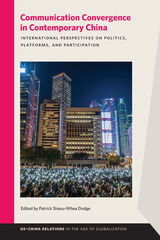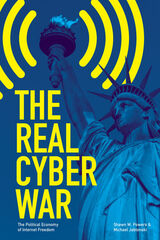2 books about Internet and international relations

Communication Convergence in Contemporary China
International Perspectives on Politics, Platforms, and Participation
Patrick Shaou-Whea Dodge
Michigan State University Press, 2020
In a speech opening the nineteenth Chinese Communist Party Congress meeting in October 2017, President Xi Jinping spoke of a “New Era” characterized by new types of communication convergence between the government, Party, and state media. His speech signaled that the role of the media is now more important than ever in cultivating the Party’s image at home and disseminating it abroad. Indeed, communication technologies, people, and platforms are converging in new ways around the world, not just in China. This process raises important questions about information flows, control, and regulation that directly affect the future of US–China relations. Just a year before Xi proclaimed the New Era, scholars had convened in Beijing at a conference cohosted by the Communication University of China and the US-based National Communication Association to address these questions. How do China and the United States envision each other, and how do our interlinked imaginaries create both opportunities for and obstacles to greater understanding and strengthened relations? Would the convergence of new media technologies, Party control, and emerging notions of netizenship in China lead to a new age of opening and reform, greater Party domination, or perhaps some new and intriguing combination of repression and freedom? Communication Convergence in Contemporary China presents international perspectives on US–China relations in this New Era with case studies that offer readers informative snapshots of how these relations are changing on the ground, in the lived realities of our daily communication habits.
[more]

The Real Cyber War
The Political Economy of Internet Freedom
Shawn M. Powers and Michael Jablonski
University of Illinois Press, 2015
Contemporary discussion surrounding the role of the internet in society is dominated by words like: internet freedom, surveillance, cybersecurity, Edward Snowden and, most prolifically, cyber war. Behind the rhetoric of cyber war is an on-going state-centered battle for control of information resources. Shawn Powers and Michael Jablonski conceptualize this real cyber war as the utilization of digital networks for geopolitical purposes, including covert attacks against another state's electronic systems, but also, and more importantly, the variety of ways the internet is used to further a state’s economic and military agendas.
Moving beyond debates on the democratic value of new and emerging information technologies, The Real Cyber War focuses on political, economic, and geopolitical factors driving internet freedom policies, in particular the U.S. State Department's emerging doctrine in support of a universal freedom to connect. They argue that efforts to create a universal internet built upon Western legal, political, and social preferences is driven by economic and geopolitical motivations rather than the humanitarian and democratic ideals that typically accompany related policy discourse. In fact, the freedom-to-connect movement is intertwined with broader efforts to structure global society in ways that favor American and Western cultures, economies, and governments.
Thought-provoking and far-seeing, The Real Cyber War reveals how internet policies and governance have emerged as critical sites of geopolitical contestation, with results certain to shape statecraft, diplomacy, and conflict in the twenty-first century.
Moving beyond debates on the democratic value of new and emerging information technologies, The Real Cyber War focuses on political, economic, and geopolitical factors driving internet freedom policies, in particular the U.S. State Department's emerging doctrine in support of a universal freedom to connect. They argue that efforts to create a universal internet built upon Western legal, political, and social preferences is driven by economic and geopolitical motivations rather than the humanitarian and democratic ideals that typically accompany related policy discourse. In fact, the freedom-to-connect movement is intertwined with broader efforts to structure global society in ways that favor American and Western cultures, economies, and governments.
Thought-provoking and far-seeing, The Real Cyber War reveals how internet policies and governance have emerged as critical sites of geopolitical contestation, with results certain to shape statecraft, diplomacy, and conflict in the twenty-first century.
[more]
READERS
Browse our collection.
PUBLISHERS
See BiblioVault's publisher services.
STUDENT SERVICES
Files for college accessibility offices.
UChicago Accessibility Resources
home | accessibility | search | about | contact us
BiblioVault ® 2001 - 2024
The University of Chicago Press









